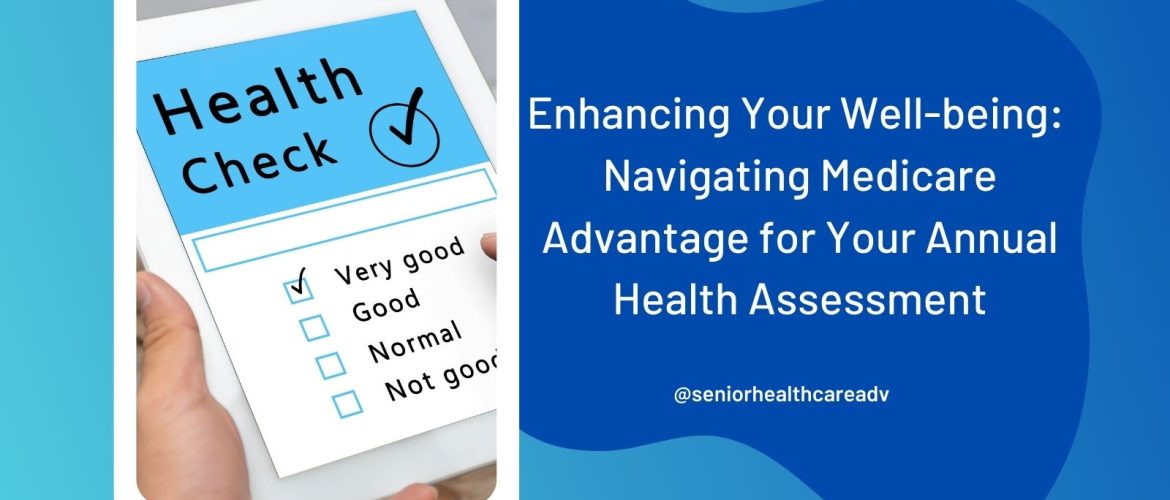Enhancing Your Well-being: Navigating Medicare Advantage for Your Annual Health Assessment
Getting an annual checkup is important for people of all ages. It can help assess potential problems before they start, and early detection of illnesses or conditions is a way to practice preventive health care. Preventative measures such as establishing a baseline with your doctor can often lead to better treatment options.
Normally, Original Medicare does not cover an annual checkup. Depending on your Medicare Plan, any tests and the exams are separate services, and you may incur the cost related to each.
Getting your annual checkup begins with assessing your overall health. Your physician will address any of your concerns, assess the basic function of your major organs, update your vaccines, and develop a treatment plan to get you healthy and then to maintain good health. The exam usually takes around 30 minutes to complete.

What is a Physical Exam?
Terms referring to a physical exam include:
- Wellness check, or Well-check.
- Checkup.
- Preventive care visit.
- Annual physical exam.
- Routine physical exam.
- Pre-employment physical exam.
Why Do I Need a Physical Exam?
The physical exam’s purpose is to:
- Assess your general health.
- Develop a treatment plan that has recommendations about how you can reach and/or maintain good health.
- Assess for any underlying conditions
- Address any symptoms you may be experiencing.
- Get vaccines or immunizations.
- Verify and document your state of health for a job and provide medical clearance for a new or existing job or to play a sport (pre-employment physical).
How Often Do I Need a Physical Exam?
Normally, primary care physicians suggest a physical exam annually. You can prepare for your “check up” by writing a list of the following and taking it with you to the appointment.

What to Bring to Your Annual Physical Exam
- Any supplements you are currently taking
- Any medications you presently take. Highlight any prescription refills you need.
- Allergies
- Symptoms: what they are, how they look, when they happen, how long they have lasted, and anything that relieves them.
- Lab test results, reports, and films from prior tests
- Any ongoing measurements you have been taking, such as
- Any measurements you have been keeping track of, such as glucose readings or blood pressure readings.
- History of surgeries
- Past medical records (diagnoses, procedures, and treatments)
- A list of questions you want answered
- Names, phone numbers, and addresses related to your medical history, like doctors, specialists, or other care providers you are currently seeing or have seen in the past. Let your doctor know if you want your reports sent to those providers.
What Can I Expect During a Physical Exam?
During your physical exam, your doctor or other healthcare provider will start by asking you general questions about your health, such as “Do you have any symptoms, concerns, or questions about your health?” If you are seeing your healthcare provider about a pre-employment assessment or sports physical, let your provider know at the start of the exam so they can fill out the required documents.
Before you meet with your primary care doctor, a member of your care team will:
- Measure your weight and height.
- Take your vital signs.
- Go over all the medications and supplements you are currently taking and document them.
- Review your and your family’s medical histories.
- Take a social environment assessment and see how it relates to your health (i.e., alcohol intake, smoking, substance use, etc.).
- Discuss medical care preferences, including a do-not-resuscitate (DNR) status or a living will.
- Review and discuss any healthcare or related concerns.
- Do you feel any pain or unusual discomfort?
- Where is the pain/discomfort located?
- How does the discomfort or pain feel? Is it stabbing, dull, sharp, achy, or pressured?
- On a pain scale from 1 to 10, with 10 being the most severe, assign a number.
- Does the pain come and go? How long does it last? How long have you had it?
- Is there anything you believe causes the pain? For instance, is it after you eat? After you exercise? If you sit or lay a certain way? Is it at night or in the morning?
- Is there anything that relieves the discomfort? Medications, pain, sleep/rest, position?
Physical Exam (Medical Examination)
- Auscultation: Using a stethoscope to listen to your body’s heart, lungs, or other organs.
- Inspection: Assessing your body’s appearance.
- Palpation: Feeling your body with their hands or fingers.
- Percussion: Tapping on specific areas of your body and listening to the sounds.

During a Physical Exam, Your Doctor or Healthcare Provider Will:
- Listen to your heart and lungs with a stethoscope. Your provider will ask you to take deep breaths and/or breathe normally.
- Using an otoscope, your provider will look inside your ears.
- Using a light and tongue depressor to look at your throat and inside of your mouth. They will ask you to say “ah” as part of the exam.
- Feel or inspect your glands and lymph nodes in your neck. Using their fingers, they will gently press on your neck to feel if there are any swollen lymph nodes or glands.
- Gently press on your abdomen to check the size and location of your organs, and ask you if it hurts. You will generally be laying flat (supine) on your back.
- Assess your skin for any unusual rashes, moles, breakouts,, or concerns you may have. They will also ask if you have noticed any changes in your skin.
- Conduct a pelvic and breast exam or a prostate and genital exam, depending on your anatomy and age
- Give you any immunizations or vaccinations you need.
Your physical exam can vary based on the reason for your visit and your age. If you have any specific questions or concerns, your healthcare provider will take a closer look at the affected area of your body.
How Long Does a Physical Exam Take?
A physical exam takes about 30-45 minutes to complete.
What Can I Expect After a Physical Exam?
After your physical exam, you can go about your day like any other. Your doctor will discuss with you the results of his findings, except for your lab analysis, for which he will usually ask you to come back in a week to discuss your labs. At this point, your provider may provide you with a referral to a specialist or recommend additional testing.
Seniors and Other Health Concerns
As you are in or approaching your golden years, there are a couple of other health and wellness issues that should be assessed during your annual checkup. These are memory-related conditions and mental health issues.
Sometimes, seniors suffering from depression are misdiagnosed as having dementia. For instance, sadness may not be the presenting issue. Seniors with depression may also experience grumpiness, fatigue, and a loss of interest in social activities.
Seniors should also be assessed for any changes in memory or functional abilities. Attending your annual checkup can help providers catch any problems early.
It is important to keep in mind that your emotional health and wellness are just as important as your physical health when it comes to living happily and as independently as possible.
Disclaimer: A Senior Healthcare medical specialist has reviewed this information. It is for educational purposes only and is not intended to replace the advice of your doctor or other health care provider. We encourage you to discuss any questions or concerns you may have with your provider.










